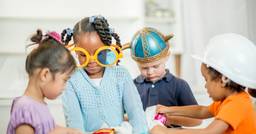Promoting Cognitive Development in Preschool: Key Techniques and Milestones
During the early childhood years (ages 2.5 – 6 year-olds), young children undergo significant cognitive growth, which is a crucial part of their overall development. Cognitive abilities refer to a child’s capacity for reasoning, thinking, and understanding, and they form the foundation for learning and future academic success. The early years are essential for developing these key cognitive skills, which support language development, social skills, problem-solving abilities, and more. This stage sets the groundwork for how children will approach learning, interact with others, and make sense of the world around them.
The Stages of Cognitive Development in Early Childhood
To better support children’s cognitive development, it is helpful for parents and educators to understand cognitive development milestones. Jean Piaget’s theory of cognitive development is often used to describe the stages of learning in young children. According to Piaget, the preoperational stage (ages 2 to 7) is a time when children start to engage in more complex thinking but are still egocentric, meaning they see the world primarily from their own perspective. This stage is marked by an increased ability to use symbols and engage in pretend play, but children’s thinking is also limited by their reliance on sensory experiences and their difficulty understanding complex concepts.
Understanding where a child is within this stage can help guide parents and educators in fostering a child’s learning through age-appropriate activities and techniques.
Key Cognitive Development Skills Learned During Preschool
The preschool years are filled with growth and exploration. Here are some of the major cognitive skills that children develop during this stage:
- Questioning and Thinking Skills: One of the most significant milestones for young children is learning to ask questions. Questions like “Why?” and “How?” signal that a child is beginning to develop critical thinking and language skills. This cognitive ability helps them explore cause and effect, make connections, and understand how things work in their world. Activities such as storytelling, science experiments, and open-ended questions during play can nurture these skills.
- Spatial Relationships: Preschoolers are naturally curious about their environment and start to explore how objects relate to each other in space. Activities that involve fitting shapes into corresponding spaces, like puzzles and building blocks, help children understand the concept of volume, balance, and space. This skill is important for later development in math and geometry.
- Problem-solving Skills: During the preschool years, children start to experiment, investigate, and collaborate with others to solve problems. Whether it’s building a tower that won’t fall or figuring out how to complete a simple puzzle, problem-solving helps develop logical thinking and resilience. Activities such as scavenger hunts, treasure hunts, and hands-on problem-solving games can provide opportunities for developing children to practice these skills in a fun and engaging way.
- Imitation and Role-Playing: Imitation is an essential cognitive skill that allows children to learn through observing and mimicking others. Role-playing, such as pretending to be a parent, doctor, or teacher, is a fundamental way for children to learn social roles, develop empathy, and practice language development. These types of activities encourage a child’s cognitive development as they begin to think in symbolic terms and use their imaginations, fostering creativity and cognitive flexibility.
- Memory and Working Memory: Memory development during the preschool years is essential for processing and storing information. Preschoolers begin to differentiate between people, objects, and events, which supports their ability to recall past activities and routines. This is crucial for developing working memory, which helps them follow directions, learn new concepts, and stay organized. Simple memory games and activities such as matching cards or “Simon Says” can help strengthen memory skills.
- Number Sense: Early math skills start to take shape during the preschool years. Children develop an understanding of numbers, quantities, and basic math concepts through counting and recognizing numerical relationships. Counting objects in their environment, singing number songs like “Five Little Monkeys Jumping on the Bed,” and playing counting games help build this foundation. Number sense is an essential skill that sets the stage for future math learning.
- Classification and Categorization: Preschoolers learn how to sort, group, and categorize objects based on different attributes, such as color, size, and shape. This helps them make sense of their environment and understand relationships between objects. Activities like sorting colored pom-poms, organizing toys by size or shape, and grouping different kinds of animals help children practice classification and categorization.
- Symbolic Play and Imaginative Play: Imaginative play, such as pretending that a toy phone is a real phone or a block is a slice of pizza, is a vital part of cognitive development. This type of play encourages children to use objects, ideas, and actions to represent other things, which helps them develop creative thinking and expand their understanding of the world. Dress-up play, pretending to be a superhero or an animal, and role-playing family activities support this skill.
3 Effective Techniques to Promote Cognitive Development in Preschoolers
While cognitive skills naturally progresses with early childhood development, there are effective techniques that parents and educators can use to support and promote these skills:
- Practice the Alphabet: Learning the alphabet is a cornerstone of early childhood education. Singing the ‘ABC’ song, reading alphabet books, and using flashcards are excellent ways to support early language development. Additionally, activities like alphabet scavenger hunts, where children look for objects starting with each letter, can make learning interactive and fun.
- Count and Number Games: Counting is a foundational math skill that starts in the preschool years and sets the stage for more advanced math learning. Counting objects like toys, snacks, or natural items found outdoors helps children develop an understanding of numbers and quantities. Board games that involve counting, such as “Chutes and Ladders,” or even simple counting activities during daily routines, make this learning engaging and practical.
- Identify Colors and Shapes: Color and shape recognition are key parts of preschool cognitive development. Parents and educators can point out colors and shapes in everyday items, such as fruits, toys, or classroom materials, to build these skills. Activities like matching games, color hunts, and shape sorting games help children practice these concepts in a hands-on manner.
The Role of Educators and Parents in Supporting Cognitive Growth

As children navigate their preschool years, parents and educators play a vital role in fostering cognitive abilities and providing enriching learning experiences. Creating a nurturing and stimulating environment encourages exploration, play, and active learning. Integrating outdoor play, storytime, hands-on activities, and interactive games can significantly boost cognitive development.
Preschool classrooms should be filled with opportunities for children to experiment and play with different materials and ideas. Parents can support learning at home by engaging in activities that stimulate thinking skills, such as reading together, having conversations that encourage children to ask questions, and incorporating problem-solving games into playtime.
With the right combination of play, learning, and support, parents and educators can help young children achieve their developmental milestones and build a strong foundation for lifelong learning and success.
If you’re looking to enhance your preschool curriculum, Lillio Learning, powered by FunShine Express, offers a range of resources designed to support educators. With both physical and digital materials for children ages 0-5, Lillio Learning provides tools that can help make planning and teaching more manageable.
Maddie is a Registered Early Childhood Educator with a Master's in Early Childhood Studies. Her specialty is in Children's Rights and she is currently a Content Strategist for HiMama!
More by Maddie
Maddie Hutchison
December 18th, 2024
9 mins
Related Articles

The Benefits of Loose Parts Play for Young Children
December 10th, 2025 | Maddie Hutchison


